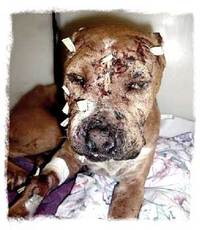UK Questioning its Dangerous Dog Act

Here’s a tip for people in the US who want legislation outlawing (or otherwise discriminating against) certain breeds of dogs, such as the pit bull. It doesn’t work. The UK’s 1991 Dangerous Dog Act banned four breeds, including the American pit bull, the Japanese tosa, and "any dog of any type designated for the purposes
of this section by an order of the Secretary of State, being a type
appearing to him to be bred for fighting or to have the characteristics
of a type bred for that purpose," and now they’re questioning the efficacy of the Act.
Let’s deconstruct:
- The Act makes it illegal to breed, sell, give away or abandon any of the breeds in question. And if you own one already it must be registered (listed on the Index of Exempted Dogs), microchipped, neutered, muzzled and on a lead when in public.
- Fines, imprisonment and the "destruction" of the dog are possible consequences for a dangerous dog not being "under proper control."
- After the investigation of the mauling death of a 5-year old by a pit bull, the Chief Constable of Merseyside Police, Bernard Hogan-Howe has voiced his concern (and that of other chief constables) that the Act is confusing and needs revision.
- The 5-year old’s uncle owned the pit bull in question. The dog was shot dead by police and the uncle pleaded guilty to owning a banned animal and is looking at a prison term. The girl’s death has sparked a national debate.
- One of the revisions to the Act might be an exemption from the banned dogs list without court involvement.
- Another issue is that the Act doesn’t cover all aggressive dogs; only certain breeds. Also, the definition of pit bull is vague. As a Kennel Club spokeswoman said, "Pit bulls have certain traits but in the hands of responsible owners they would not be a danger. The act hasn’t worked; it’s failed to prevent a significant number of attacks." The RSPCA agrees and a spokesman said, "We don’t believe certain types are more dangerous than others. It’s extremely difficult to prove in court whether a dog is an American pit bull. There are only one or two people in the country who have the ability to prove it." There are two issues there–whether a dog is a pit bull and whether certain breeds are more dangerous than others. However, moving to a deed, not breed Act appears inevitable in the UK (though it will undoubtedly take some time).
The US has a powerful lesson to learn, here, as some of our communities debate the banning of certain breeds. I know four pit bulls and none are vicious at all. They were all adopted by loving families who treat them the same way they treat their other dogs. There hasn’t been one problem with them, and two were rescued fighting dogs covered with scars. Our no-kill shelter is full of pit bulls and the people there work hard to rid them of their fears and insecurities and adopt them out. There has never been a problem with any of the dogs in their new homes. In other words, even pit bulls who were trained to fight–and who did fight–can be rehabilitated and return to their natural personalities.
Breeds aren’t dangerous–people are. Educate yourself about the "sad reality" of being a pit bull.




*The SAVAGERY of MAN…NOT the ANIMALS!!*
I don't know what else to say right now…
I believe that one could support the end of the breeding of these dogs not due to the concept of discrimination but based on the principle of respect. The groups we call breeds (including pit bull dogs) are variations of domesticated wolves. And I think indeed creating them ~is~ wrong, and I can't imagine how it could be justified under animal-rights theory.
As long as we have domesticated animals they will be subject to human whims, and although some might be systematically subjected to more obvious maltreatment than others, it's the whole custom of petkeeping that's the trouble; what we see here is one example of what's permitted to humanity once domestication is accepted. Domesticated animals will always depend on stewardship, mercy, and those various kinds of paternalism — and they'll be lucky if they can get it.